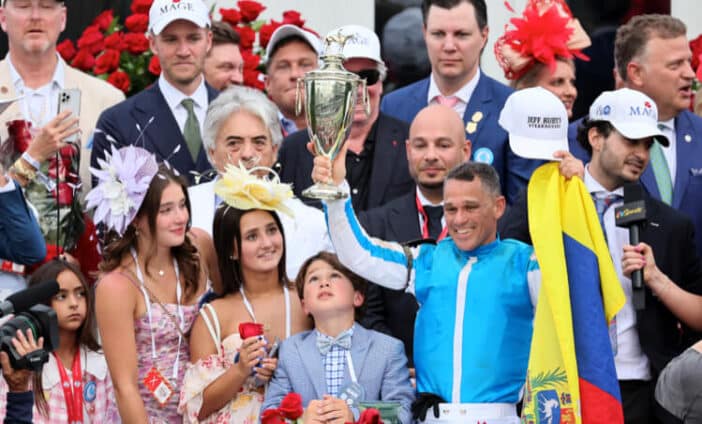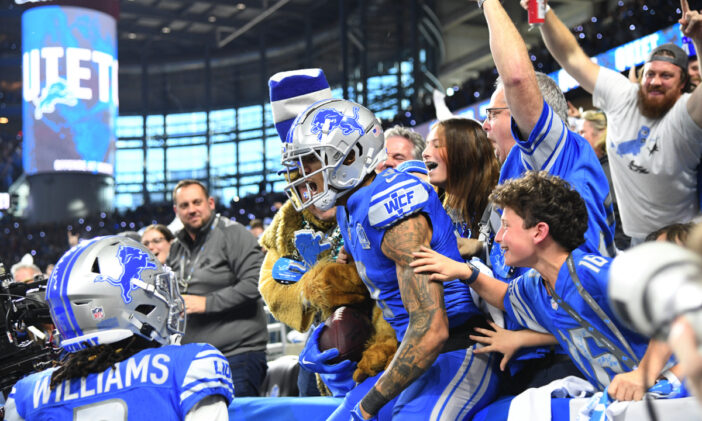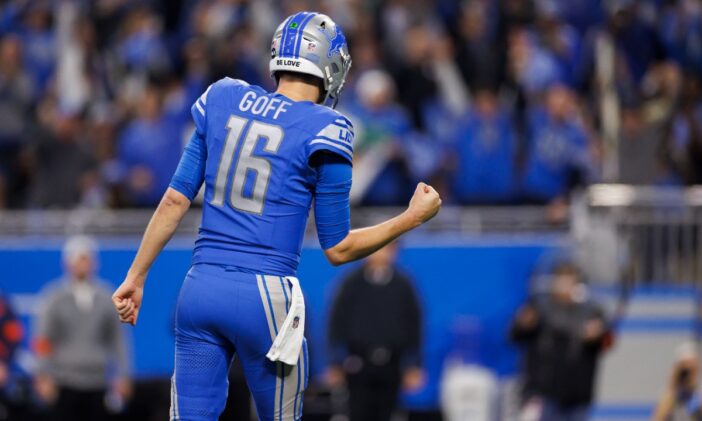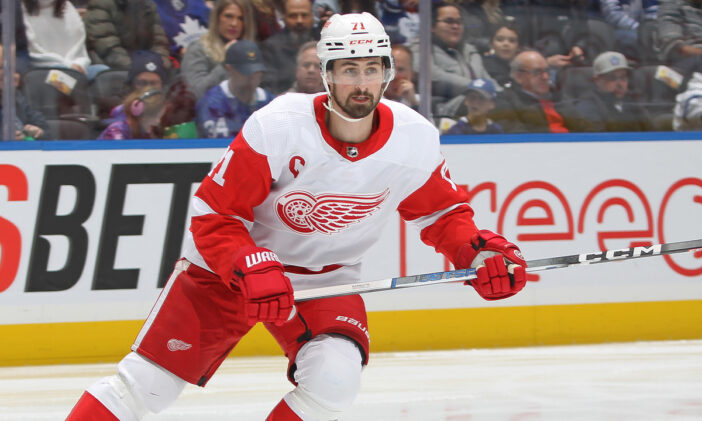Watch any Formula 1 race, the Kentucky Derby, the Masters, or Wimbledon on TV, and you’ll come away with the impression that these are sports played by and in front of impossibly wealthy individuals, leaving the dusty diamonds, the frozen ponds, the wooden backboards, and the sweat-soaked shoulder pads to the unwashed masses.
But those same modest proving grounds apply to even the sports of kings, where the financial barriers to entry can often be too high for deserving athletes — or owners — to clear. Enter Commonwealth, a sports ownership and investment cooperative dreamed up by a pair of Western Michigan grads that’s achieved considerable early success in horse racing and now has its sights set on golf.
Typically, when a Kentucky Derby champion saunters into the winner’s circle at Churchill Downs, the number of people admitted resembles a roped-off table in the VIP space of an already exclusive nightclub — the jockey, the trainer, a groom, the owner, and maybe an immediate family member or two. But when Mage strode in with a wreath of roses around his neck this past May, he was greeted by a sea of humanity, some wearing white hats with the horse’s name on them.
Two of the guys hooting and hollering in Mage hats were Commonwealth’s co-founders, Chase Chamberlin and Brian Doxtator. Hundreds of Commonwealth investors owned shares of Mage, with Commonwealth’s collective stake in the horse coming to 25%.
“I look back and see how much richer the winner’s circle looked at the Kentucky Derby,” Chamberlin told MI Bets. “We had a bunch of young, excited people who are now hooked on the sport forever.”
Chamberlin, now 33, and Doxtator, eight years his senior, both grew up in Richland, Michigan, and attended Western. The two didn’t know each other well when they were younger, but “Brian and my sister were best friends growing up,” said Chamberlin.
The pair connected online in the late 2010s. Doxtator, a scratch golfer, had the startup acumen, while Chamberlin, who started riding horses at age 4, knew the racing industry. Naturally, the first sports Commonwealth chose to test its mettle in were horse racing and golf.
How Commonwealth works
If there’s a group that’s cut a trail in the meadow for Commonwealth to gallop through, it’s Terry Finley’s West Point Thoroughbreds.
Among the first outfits to sell shares in racehorses online, West Point co-owned the 2022 Breeders’ Cup champion Flightline. Arguably the most talented racehorse in the history of the sport, the undefeated colt was valued at $184 million after being retired to stud last November.
Commonwealth is doing what West Point does, albeit at a more modest level and with an eye toward other sports. Commonwealth owners can buy into a horse for as little as $50 a share, and the horse’s initial upkeep and training are built into the price to eliminate the prospect of unexpected bills.
When Chamberlin, who lives in Lexington, Kentucky, started shopping the idea for Commonwealth around the Bluegrass State, the reaction was “kind of split in between” enthusiasm and blue-blooded skepticism.
“The funniest part is you’ve got a lot of people who say, ‘We’ve got to get younger people involved,’ and then people propose solutions and they’re like, ‘You can’t do that,’” said Chamberlin. “And I’ll be like, ‘What you’re doing hasn’t been working.’”
Others groused that Commonwealth’s model equated to “buying horses with cheap money” and that it would “cheapen the sport.”
On the flip side, Chamberlin said, “We’ve also been met with incredible enthusiasm from the tracks, and there are plenty of old Kentucky hard boots who love what we’re doing and have been nothing but supportive. We’ve brought in a bunch of people who could very easily own a string of horses. It’s a mistake to think that someone who buys a $50 share can’t afford to do more.”
Finley can relate. Looking back to when he nudged West Point out of the gate, he said, “There probably was some pushback 10 to 15 years ago as partnerships were really starting to get their legs underneath them and buy at the upper end of the market. It doesn’t really matter what any particular sector of the market — the old guard, the blue bloods — says anymore in regards to partnerships. … The bottom line is that the partnerships and the co-ops, they have transformed the business in a positive way, and that transformation is ongoing.”
Finley isn’t well-acquainted with the Commonwealth co-founders and views them as part ally, part competitor. But he likes what he’s seen so far.
“Certainly, they look like they’re doing a very good job,” he said. “They’re enthusiastic and have locked onto some very nice horses. Money doesn’t ensure that you’re going to be associated with good horses. More so, it’s good people and a lot of luck, and they seem to have that going for them.
“They (Commonwealth and others) have acted like feeder companies into a company like ours, just as we’re a feeder company into people that do the partnerships. Then they graduate and do it themselves.”
Big swings
One of the first horses Commonwealth bought into and offered shares in was Country Grammer.
After winning the Peter Pan Stakes at age 3, the horse had blossomed into one of the best 4-year-olds in the land by the time Commonwealth and its shareholders bought in, winning the Grade 1 Hollywood Gold Cup at Santa Anita to establish himself as an early Breeders’ Cup Classic contender.
But then the horse hurt its ankle, and Commonwealth offered to refund its shareholders’ investments. All but about 5% said “no, thanks” and stayed aboard for the ride.
And what a ride it was. Nine months after suffering the injury, Country Grammer was shipped to the Middle East and finished second in the Saudi Cup in his return effort, followed by a victory in the sport’s richest race, the Dubai World Cup.
At the time, Chamberlin had $128 in his bank account.
“The company was doing great, but Brian and I weren’t paying ourselves,” Chamberlin explained. “The night of the Dubai World Cup, he wins and we knew everything was going to change for the company. Our investors killed it and we knew that was going to drive interest from outside investors. I was sobbing because I was excited, but also because there was so much riding on that moment.”
At the onset of its expansion into golf, Commonwealth is offering shares in a pair of pair of promising Korn Ferry Tour players and is close to onboarding “two All-American candidates,” Chamberlin said. The player partnerships take the shape of six-year income-share agreements, wherein for the first three years, Commonwealth gets 30% of the players’ on-course earnings in exchange for raising capital to keep them outfitted and traveling to tournaments without having to sweat.
“There are a lot of predatory deals being done in golf and other sports,” said Chamberlin. “Some of these guys give up 60% of their income just to get a backer. That didn’t sit well with Brian. He really cares about the game. We even have buyout provisions in our contracts.”
Looking ahead, Chamberlin said, “I think tennis will probably be our third sport. Especially after this Derby win, it’s been pretty exciting the number of inbound emails we’ve received from Formula 3 drivers, contact sports, stock car racers.”
Photo: Andy Lyons/Getty Images





